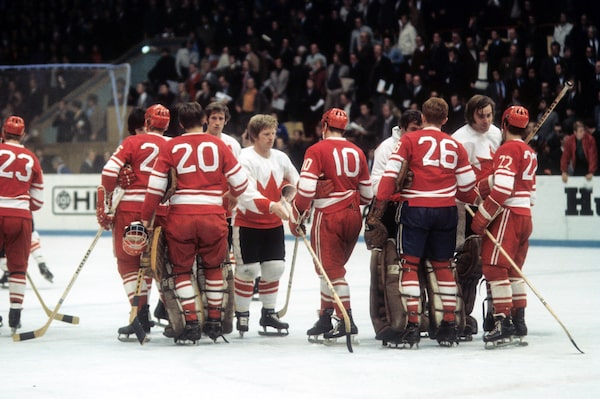
The Soviet Union and Canada shake hands after the Canadians defeated the Russians in Game 8 of the 1972 Summit Series on September 28, 1972 at the Luzhniki Ice Palace in Moscow, Russia.Melchior DiGiacomo/Getty Images
This September marked 50 years since the eight-game Summit Series between the Soviet national hockey team and some of Canada’s top NHL players. The series—which Canada won at the last minute on left winger Paul Henderson’s goal—taught Canada some hard lessons that remain relevant beyond sports.
Successful products are good politics
In his recent book Ice War Diplomat, Gary J. Smith says one of the reasons he and other diplomats entered into negotiations for the series with the Soviets is that “the decline of our hockey capability had serious international consequences” for our reputation. When Canada makes something good, it boosts the entire country’s international standing. The inverse is also true.
Assume the best of your competitors
Team Canada won just one of the first four games played in Canada. One reason for this is the Canadian scouts had seen one bad game from the Soviet goalie, Vladislav Tretiak, and assumed he was no threat. The Canadians were caught off guard by how good he and the other Soviet players turned out to be. If your people insist you’re looking at an easy win, you might need new people.
Adapt or die
In 1972, it was still common for North American athletes to spend the summer doing other jobs, and Team Canada was stunned by the Russians’ superior conditioning and organization—a byproduct of year-round training. After that, the traditionally individualistic, laissez-faire style of Canadian hockey would forever be modified to make room for the more efficient European ethos. In a globalized world, there’s not much room for different regions to do things their own way, especially if that way is inferior.
Keep it classy
A common complaint from the Canadians was that the refs gave fewer penalties to the Russians, who were quieter and less abrasive than their pugnacious rivals—epitomized by Bobby Clarke, who slashed the ankle of Russian centre Valeri Kharlamov in Game 6. To this day, questions swirl about whether Clarke took out Kharlamov on purpose and whether the Canadians would’ve won had the Soviets’ star player not been injured. Bad behaviour or a win-at-all-costs attitude might give you a short-term boost but could harm your reputation over the long term.
National pride sells
Canadians don’t have a reputation for hyper-patriotism like Americans do, but when they saw Team Canada go up against their biggest Cold War enemy and win, it became a nationwide sensation. The seminal series has been commemorated with plenty of merch over the years (including a T-shirt with the tag line “The Thrill of a Lifetime”) and countless documentaries, the latest of which, a four-hour CBC docuseries called Summit 72, is slated for this fall. The takeaway: There’s money to be made from Canadians’ untapped desire to win.
Your time is valuable. Have the Top Business Headlines newsletter conveniently delivered to your inbox in the morning or evening. Sign up today.